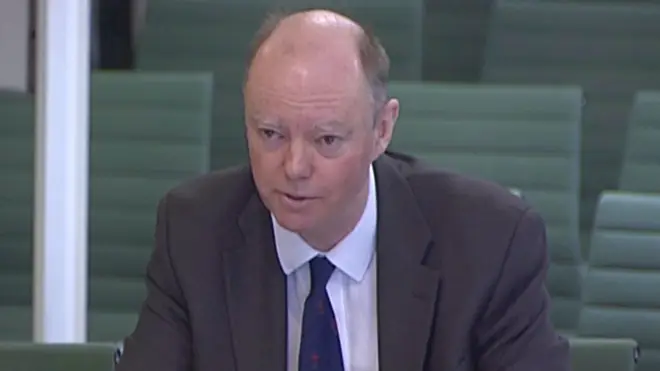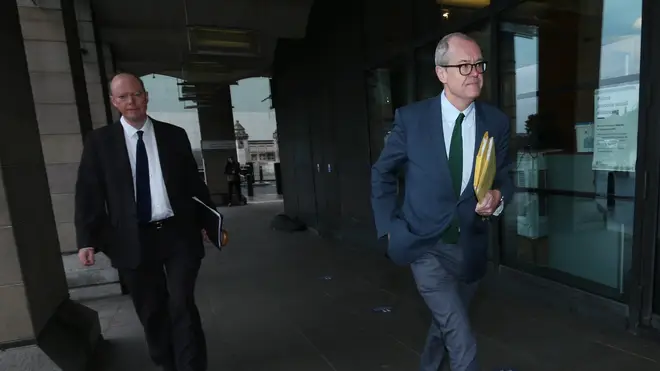
Dean Dunham 9pm - 10pm
9 December 2020, 16:30 | Updated: 9 December 2020, 16:33

Professor Chris Whitty has said he will take any Covid-19 vaccine offered to him, adding that "society" will decide the extent to which restrictions can be lifted in the New Year.
After the NHS mass vaccination programme was launched this week, England's chief medical officer told MPs he would be keen to have a jab to protect himself.
He said that once around 20 million people in at-risk groups, over-50s and health and care workers are vaccinated, a decision can be made about whether tough restrictions are eased.
But he added that "for the next three months, I want to be very clear, we will not have sufficient protection".
READ MORE: Two NHS staff 'recovering well' after allergic reaction to Covid vaccine
READ MORE: London must enter Tier 3 ‘in next 48 hours’ or risk ‘terrible situation’
It comes after Health Secretary Matt Hancock told LBC's Nick Ferrari on Tuesday he hopes we can have a "normal summer" in 2021.
Prof Whitty told the Commons Science and Technology and Health and Social Care Committee: "When it gets to my stage to be vaccinated... I will absolutely have the vaccine.
"I will either have a choice between having no vaccine or the vaccine that is available for me at that stage, and I'll be very happy with that.
"If the choice is between no vaccine and a good vaccine, I'm going to choose a good vaccine.

Terminally ill man says he 'hasn't been considered' a vaccine priority
"I don't really have a strong view as to which good vaccine I have, provided it's safe and effective, which is what the whole (regulatory process)... is there to do."
Asked at what point restrictions may no longer be needed, he said it was a "de-risking process".
Vaccination will reduce the Covid-19 death rate and hospital admissions and then decisions can be made, he said.
"At a certain point, society, through political leaders, through elected ministers and through Parliament, will say this level of risk is a level of risk that we think it is appropriate to tolerate," he said
"Just as we accept that in an average year 7,000 people die of flu, and in a bad flu year 20,000 people die of flu, we accept that as that is what happens biologically.
"At a certain point you say, 'actually, the risk is now low enough that we can largely do away with certainly the most onerous things that we have to deal with'.

Covid vaccine: Medical advice for people with allergies
"This will be a kind of gradual retreat from that, but it is a de-risking process rather than it's just going to go away.”
Prof Whitty said that even after vulnerable groups are vaccinated, "that does leave a lot of people who could, for example, have all the syndrome of things that are currently called long Covid, there are a variety of other medical things, it's not that that will get rid of the problem completely.
"If you only were to vaccinate those 20 million people - the numbers are rough but for the sake of argument - you are still going to have a lot of people who are susceptible.”
Sir Patrick Vallance, England's chief scientific adviser, said there would still be coronavirus transmission among the population once the most vulnerable are vaccinated.
On lifting restrictions, he said it is a "science-informed political decision", adding: "Priority number one has to be protect those who are most vulnerable, you can see the effects of that.
"There will still be transmission amongst others at that point, so we need to be aware of that, and then we will know a bit more as we learn about transmission across the different vaccines, what effect they have.
"But, ultimately, then there are some decisions to be made about how much risk society wishes to take with that."

Prof Whitty said that despite the "self-discipline" and "altruism" shown so far by the British public, optimism over vaccines should not cause people to relax now.
"We're heading into spring of 2021 in much better shape than we were three or four months ago," he said.
"The first response would be to say, 'well that's it, it's done' - that would be disastrous, because then, actually, the wave would come back incredibly quickly."
Sir Patrick added there was a risk of the public thinking the pandemic is "all over" due to the Pfizer coronavirus vaccine being rolled out.
"The biggest risk we face now is everyone thinks this is all over," he said. "And it isn't all over.
"We have a very important light at the end of the tunnel with vaccines. We've got a lot to do to roll out the vaccines, we've got a lot to do to make sure the vulnerable are protected.
"We're a long way off yet knowing how we can move it to the rest of the population, that's dependent upon things like does the AZ (AstraZeneca/Oxford) vaccine get approved.
"It's not the time to suddenly say we relax everything and, if that happens, we will have a big surge."